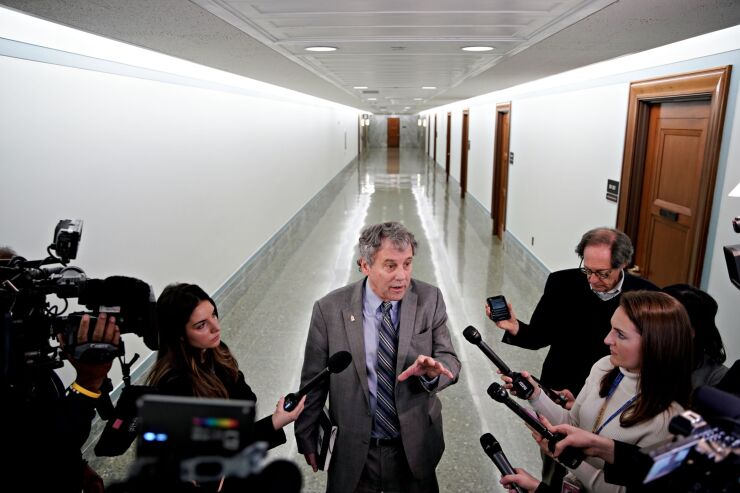
WASHINGTON — Senate Banking Committee Chairman Sherrod Brown, D-Ohio, is planning to introduce legislation related to corporate governance and executive accountability, his office said.
Brown, according to his office, supports President Joe Biden's priorities for executive compensation and penalties for executives at failed banks.
Biden last week outlined a
He asked Congress to strengthen the FDIC's authority to claw back compensation — including from stock sales — from the executives of failed banks of a similar size to Silicon Valley Bank and Signature Bank. Currently, the FDIC has that ability under the Dodd-Frank Act's special resolution authority, which applies only to the largest financial institutions.
Biden's proposal would also expand the FDIC's authority to prevent executives from holding jobs in the banking industry after their bank fails. The FDIC now has the ability to bar executives from holding jobs at other banks only if they engage in "willful or continuing disregard for the safety and soundness" of the institution.
Executive compensation is just one front that Washington policymakers are considering responding to the banking panic caused by the collapse of Silicon Valley Bank earlier this month.
Lawmakers are also weighing changing the limits of deposit insurance, and toughening oversight rules on mid-sized institutions, and although it remains unlikely that Republicans and Democrats will come to any kind of meaningful agreement on bank regulation reform in the current divided Congress, the debates lawmakers are having now could set the stage for future successful legislation.
So far, Democrats have been far more receptive to the calls for new rules around executive compensation.
Rep. Maxine Waters, D-Calif., the ranking member of the House Financial Services Committee, wrote to the heads of the Securities and Exchange Commission, the Federal Deposit Insurance Corp. and the Federal Reserve, asking them to use their oversight authorities to the "maximum extent" to hold both banks' senior executives and board directors accountable.
Brown, shortly after Biden's remarks, said in a statement that regulators need "stronger rules to rein in risky behavior and catch incompetence."
"Our job on our committee is oversight, and we will be looking at all the ways we can protect working families' money from risky bets that didn't pay off in Silicon Valley or on Wall Street," Brown said in the statement. "That includes holding accountable the executives who ran this bank into the ground and the regulators tasked with overseeing them, and it includes working to reform our laws to better protect workers, small businesses, and taxpayers from corporate greed."
Sens. Mark Warner, D-Va. and Richard Blumenthal, D-Conn., introduced a bill, the Deliver Executive Profits on Seized Institutions to Taxpayers (DEPOSIT) Act, that would recoup bonuses and profits from stock sales made by bank executives within 60 days of a bank failing, impose a 90% tax on the bonuses of bank executives who make an annual income over $250,000 during the year when a bank goes under FDIC acquisition, require bank executives to forfeit 100% of profits they made from recent bank stock trades and send the recouped funds to the FDIC insurance fund.






